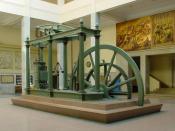Introduction
One thing I am certain of is that technology is here to stay and if you don't get on board the technology train, you will be left at the last station. From the time people are born into this world until the time they pass away, technology will be a part of human ife and it will be constantly changing. On the surface, Neil Postman's book Technopoly could be conceived as an attempt to undermine the purpose and quality of new technologies. This book follows the course of technology and shows when, how, and why technology became a dangerous enemy to human existence. Postman sees technology as a blessing and a curse that gives and takes away from social structure. This means for every benefit a new technology offers, there is always equivalent drawbacks. The problem lies when the drawbacks far exceed the significance of the benefit. In this book Postman expounds upon the increasing dependence by society on technology, and the consequences, benefits and results of moving through the three critical stages of technology: Tool-Using Culture, Technocracy and Technopoly.
At one point in time, all societies were tool-using cultures. The main characteristic of all tool-using cultures is that their tools were largely invented to do two things: to solve specific and urgent problems of physical life, such as in the use of waterpower, windmills, and the heavy-wheeled plow: or to serve the symbolic world of art, politics myth, ritual and religion (Postman, 23). The tool-using cultures were governed by spiritual principles and tradition not by personal gain or power. In the 17th century, the English statesman and "Father of Modern Science, Francis Bacon (1561-1626), believed that natural philosophy (what we call science) could be applied to the solution of practical problems, and so, the idea of...


